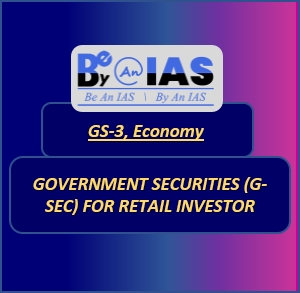CURRENT AFFAIRS
Get the most updated and recent current affair content on Padhaikaro.com
GOVERNMENT SECURITIES (G-SEC) FOR RETAIL INVESTOR
- Be N By IAS, Delhi
- 08, Feb 2021

For: GS-3: INDIAN ECONOMY, RESOURCE MOBILISATION
CONTEXT:
- The Reserve Bank of India (RBI) said on Friday (February 5) that it will give small investors direct access to its government securities trading platform.
- Retail investors can directly open their gilt accounts with RBI, and trade in government securities. The Governor of RBI, Shaktikanta Das, described this as a “major structural reform.”
GOVERNMENT SECURITIES, OR G-SECS:
- These are debt instruments issued by the government to borrow money.
- The two key categories:
- Treasury bills – short-term instruments which mature in 91 days, 182 days, or 364 days, and
- Dated securities – long-term instruments, which mature anywhere between 5 years and 40 years.
BUT CAN’T RETAIL INVESTORS ALREADY INVEST IN G-SECS?
- Indirect Investment: Small investors can invest indirectly in G-Secs by buying mutual funds or through certain policies issued by life insurance firms.
- Direct Investment: To encourage direct investment, the government and RBI have taken several steps in recent years.
- Retail investors are allowed to place non-competitive bids in auctions of government bonds through their demat accounts.
- Stock exchanges act as aggregators and facilitators of retail bids.
NEED FOR SMALL INVESTORS TO GIVE DIRECT ACCESS:
- Dominated by institutional investors: The G-Sec market is dominated by institutional investors such as banks, mutual funds, and insurance companies. These entities trade in lot sizes of Rs 5 crore or more.
- Crunch of Liquidity in secondary market: So, there is no liquidity in the secondary market for small investors who would want to trade in smaller lot sizes.
- In other words, there is no easy way for them to exit their investments.
- Earlier Attempt: “ To popularise g-secs among retail investors
- NSE GoBid app or retail debt market (RDM) segment at the Exchange.
WHAT WILL THE CURRENT PROPOSAL DO?
- RBI’s intention is to make the whole process of g-sec trading smoother for small investors.
- By allowing people to open accounts in RBI’s e-kuber system, it is hoping to create a market of small investors who will invest in these instruments.
WHY IS THE GOVERNMENT AND RBI KEEN TO PUSH G-SECS TO RETAIL INVESTORS?
The RBI is the debt manager for the government. In the forthcoming financial year, the government plans to borrow Rs 12 lakh crore from the market.
- When the government demands so much money, the price of money (i.e., the interest rate) will move up.
- It is in the government’s and RBI’s interest to bring this down. That can happen by broadening the base of investors and making it easier for them to buy g-secs.
- They are generally considered the safest form of investment because they are backed by the government. So, the risk of default is almost nil.
- However, they are not completely risk free, since they are subject to fluctuations in interest rates.
- Bank fixed deposits, on the other hand, are guaranteed only to the extent of Rs 5 lakh by the Deposit Insurance and Credit Guarantee Corporation (DICGC).
Source: Indian Express
MCQs:
Q. Government securities are debt instruments issued by the government to borrow money. Consider the following statements in this context.
- Dated securities are short-term instruments which mature in 91 days, 182 days, or 364 days, and
- Treasury bills are long-term instruments, which mature anywhere between 5 years and 40 years.
Which of the above statements is/are correct?
- a) 1 Only
- b) 2 Only
- c) Both 1 and 2
- d) None of the above
ANS: D